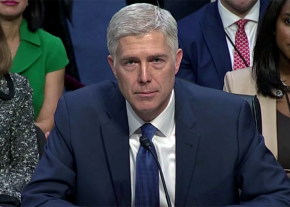An enemy of choice revealed
There are plenty of reasons to oppose the confirmation of Neil Gorsuch to the Supreme Court, but it doesn't look like Democrats will meet the occasion, writes .
IN THE aftermath of Judge Neil Gorsuch's Senate confirmation hearings to be a Supreme Court justice, one thing is clear: If confirmed, he will be another conservative packing the Court and will likely line up with his fellow right-wingers to curtail abortion rights even further.
Gorsuch himself has written little on abortion specifically and has not ruled on any abortion cases. However, his previous legal writings on personhood, corporate entities and his interpretation of constitutional rulings on abortion restrictions provide clues to how his tenure on the court may impact the 1973 Roe v. Wade decision that legalized abortion.
Gorsuch is what's known as a "legal textualist"--like Antonin Scalia, the arch-conservative justice he has been nominated to replace. That means Gorsuch interprets the words of the Constitution literally, rather than taking into consideration anything else. Scalia, for example, based his legal opposition to abortion on the fact that abortion is not mentioned in the Constitution.

During his presidential campaign, Trump promised to appoint "pro-life judges" and he vowed that Roe v. Wade would be overturned "automatically." If Gorsuch is appointed, he would return the Court to its previous conservative 5-4 balance--though without a pending case that could overturn abortion rights, Roe v. Wade would remain law.
The greater threat that Gorsuch poses is not in overturning legal abortion entirely, but in adding his vote to a conservative majority in favor of further chipping away at abortion access.
This has been the standard right-wing playbook since the 1992 Casey v. Planned Parenthood decision, in which the Supreme Court reaffirmed Roe, but ruled that a state could place limitations on abortion as long as they did not place an "undue burden" on the woman. Since the Court failed to stipulate exactly what makes a burden "undue," however, states have since passed hundreds of laws mandating everything from waiting periods to ultrasounds to arcane clinic regulations and more.
However, if Gorsuch had the chance to overturn abortion rights entirely, it's plausible that he would. In both a 2006 book and a 1996 amicus curiae ("friend of the court") brief, Gorsuch wrote that the Supreme Court's reaffirmation of the right to abortion in the Casey decision honored precedent, but wasn't based on the merit of the rights itself.
One of the few cases where Gorsuch has written about abortion specifically was a 1996 amicus brief regarding an Alaska Superior Court case in which a hospital refused to provide abortion services. The court had ruled that because the hospital was the only hospital facility within 25,000 square miles, refusing to provide abortion services would prove a significant financial, emotional and physical hardship on women seeking abortion.
The court didn't require individual health care providers to perform abortions, but simply ruled that the facility as a whole could not deny women abortion services.
Gorsuch, however, wrote that the case "'distorted' the constitutional right to an abortion," and claimed that the "court [felt] free to override the conscience of health-care providers."
GORSUCH'S CLAIM that this case overrides individual religious freedom is but one of many examples in which he equates the rights of individual and corporate entities.
Gorsuch clearly demonstrated his belief that corporate entities have the same rights as individuals in the 2014 Burwell v. Hobby Lobby Stores case. Gorsuch wrote a concurring opinion with the 10th U.S. Circuit Court of Appeals decision that, under the "Religious Freedom Restoration Act," "closely held" corporations could deny their female employees access to birth control coverage mandated by the Affordable Care Act.
In that opinion, Gorsuch "gives near absolute deference to the plaintiffs' articulation of what constitutes a substantial burden," according to the National Women's Law Center. For example, he didn't require any evidence to support Hobby Lobby's false claim that some contraceptives can cause abortions.
It's impossible to know what the coming years will hold, but Gorsuch's opinions on corporate personhood suggest he will work with conservatives on the Court to limit abortion rights and access in ways that would be devastating to women.
While some Senate Democrats are talking about a filibuster of Gorsuch's nomination, others, like Sen. Patrick Leahy, have signaled they will not try to block his confirmation--making it likely that Gorsuch will have the votes to take a seat on the Court.
This would allow some Democrats to claim they "put up a fight"--while rolling over in the end. It's a pattern that's all-too-familiar, particularly when it comes to (not) defending women's right to abortion.
Gorsuch clearly values corporate personhood over the lives of living, breathing women. We cannot allow his discrimination and bigotry to be glossed over with his assertions that his opinions simply come from a place of "constitutional purity."



